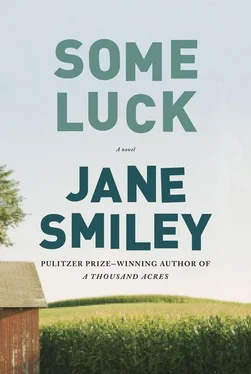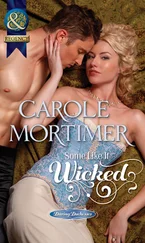“My mother’s maiden name was Carlson. But I do believe I’ve had a visitation.” She opened her pocketbook and looked at the money. Frank tightened his arm around her waist, and they walked around the neighborhood until after dark, giggling and joking.
When Frank gave Arthur his final report in September, Arthur agreed with him that Jim Upjohn was a dead end. “He talks too much,” said Frank. “He told me that he still gives money to the Daily Worker every month, because he just can’t bring himself to stop, and then he offered to finance my down payment for a house in Levittown.”
“He likes you.”
“I think he likes everyone. When we got invited to a party at his house in Darien, there were a hundred people there. I told you I went around chatting everyone up, and everyone had a story of something Jim had given them or bought from them at an inflated price. He reminds me of a friend I had in college.”
He reminded Andy of Lawrence, too.
OF COURSE he bumped into Ruben at the racetrack. Where else would Ruben be? Frank and Andy were at the rail, watching a race, and jumping up and down because Andy had a bet on the leader, and when the race was over and they turned around to go cash her ticket, she nearly fell over Ruben, who chortled at her and then noticed Frank. The funny thing he did was hop into the air and grab Frank’s hat off his head, saying, “That you, Corporal? That you?”
When Frank introduced Andy to Ruben, he realized that he had completely forgotten Ruben’s actual name — he hesitated over it so long that Ruben leaned forward and said to Andy, “Alex Rubino, ma’am. And this is my wife, Patricia De Oro Rubino.”
And if Jim and Frances Upjohn were comfortable at Belmont Park up in the clubhouse with Whitneys and Vanderbilts, then Ruben and Patty were equally comfortable down by the rail, nattering on in Italian and Spanish (Patty had been born in Puerto Rico) with Giordanos and Sanchezes. Ruben walked with them to the betting windows, and then showed them his box — not so high up or close to the finish line as where the Upjohns sat, but well used. Ruben was in real estate now. He had used his GI Bill money to get a license. Frank and Andy sat with Ruben and Patty for the last two races. It got a little cold, and Patty put on her mouton coat, which Andy complimented. Yes, it was warm. Yes, it was the newest style. Andy said, “When I first met Frank, he used to shoot rabbits for their skins.”
Ruben said, “Yeah, when I knew him, he was shooting things, too.”
“Somebody had to do it,” said Patty.
They all nodded.
By the end of the last race, it was a little too cold to walk home, so Ruben and Patty gave them a ride in their new Pontiac. It was comfortable, with a wide back seat and plenty of legroom. Frank wasn’t sure that they would see the Rubinos again, but after all he got into the habit, as the year drew to a close, of going with Ruben when he looked at lots for sale. “The smaller the better,” said Ruben. “Nobody wants a pile anymore. You get one of those big places, like if some old lady has died, and you might as well forget selling it. Nobody wants a basement or an attic, or even a goddamn staircase. The car and the house, they are getting to be about the same size.” Frank could see that, he really could.

JOE AND ROSANNA HAD several arguments about the Frederick house, but Joe didn’t take them very seriously, which Rosanna considered to be a sign that he was getting just as stubborn as Frank. Rosanna’s beef was that Joe took better care of the Frederick house than he did of his own house. Every time she went to his place (and why was she bothering? said Joe), there were dishes in the sink, crumbs on the table, clothes in a heap, beds unmade. Was that how she had raised him? The barn was cleaner than the house. She found it especially irritating because he had put in running water, hot running water, and never seemed to use it. He pointed out that he took a shower every day, which was why he had installed the hot water in the first place, but what especially got her goat was that he was over at the Frederick place all the time (not all the time, said Joe), making sure every last dust mote had been captured and shown the door. The kitchen sparkled, the floors sparkled, all that oak woodwork sparkled. Even the windows sparkled, and that was ridiculous, since the blinds were always drawn, to keep the rugs and furniture from fading. Why bother, was what she wanted to know. They hadn’t heard from Minnie in three or four months, not since Joe sent her a money order for her share of the corn and beans he had planted on her property. Joe’s side was that it was a nice place, the nicest around, and did she want it to fall to ruin the way the Grahams’ place had after they had to leave? Once a single window was broken, then it was all downhill from there to having to tear the place down, the way they’d had to tear the Graham place down because it got to be such an eyesore.
“You always have a reason,” said Rosanna.
“Yup,” said Joe, his hand tickling the top of Nat’s head. “I always do.”
“Well, you’d better contemplate the difference between a reason and an excuse. A reason is its own reward, but an excuse leads to disappointment every time.”
Of course, they both knew what she was talking about. The other side of this coin was the way she said, “For goodness’ sake, go into town and at least have a soda at the drugstore. You don’t have to learn to dance in order to play a song or two on the jukebox.” If he did say that he was driving into town, she would say, “Promise me that you will go to one other place besides the feed store.”
“How about the garage?”
“When was the last time you spoke to a woman?”
“Yesterday, I asked the operator to put a call through. Her name is Lynn.”
“Yes, it is, and she’s nice. She’s Maggie Birch’s youngest niece, and a practical girl if ever there was one.”
“I’ll tell her you said so the next time I see her.”
“Joe, you can’t—”
But he snapped his fingers to Nat and walked out of the house. He never allowed her to tell him what he couldn’t do.
In the fourteen inches of snow they had, the Frederick house looked like a Christmas card. He had cleared the front steps, but the railings still had frozen little caps all along their length. Once upon a time, Roland Frederick had done an odd thing and painted the house yellow. It was now faded, but it stood out against the snow, bright and inviting, though of course as cold inside as it was outside.
In the letter he got from Minnie saying that she was returning as a replacement for the assistant principal at North Usherton High School, she wrote, “Don’t be too impressed. I think my main job is counting heads and overseeing detention. Mrs. Ellington got pregnant, and they can’t let the kids see that, so I have a job!” She didn’t say that Lois was coming with her, but when she showed up four days later, it was Lois who was driving the car. Joe was well prepared — he had fired up the basement furnace, and Rosanna had made the beds. Lights were on upstairs and down, and the big cubical house shed its welcoming glow in every direction. Minnie would not let him drag her suitcase up the steps outside or the staircase inside. She thanked him by shaking his hand. Her hair was in a bun, and she wore a warm felt hat. But Lois, who was wearing fur-trimmed boots and a fur-trimmed hat, stood back while he carried her bags in. She said, “Oh, you should have seen the dump where we’ve been living.”
“It was not a dump,” said Minnie. “It was perfectly respectable and clean.”
Читать дальше













